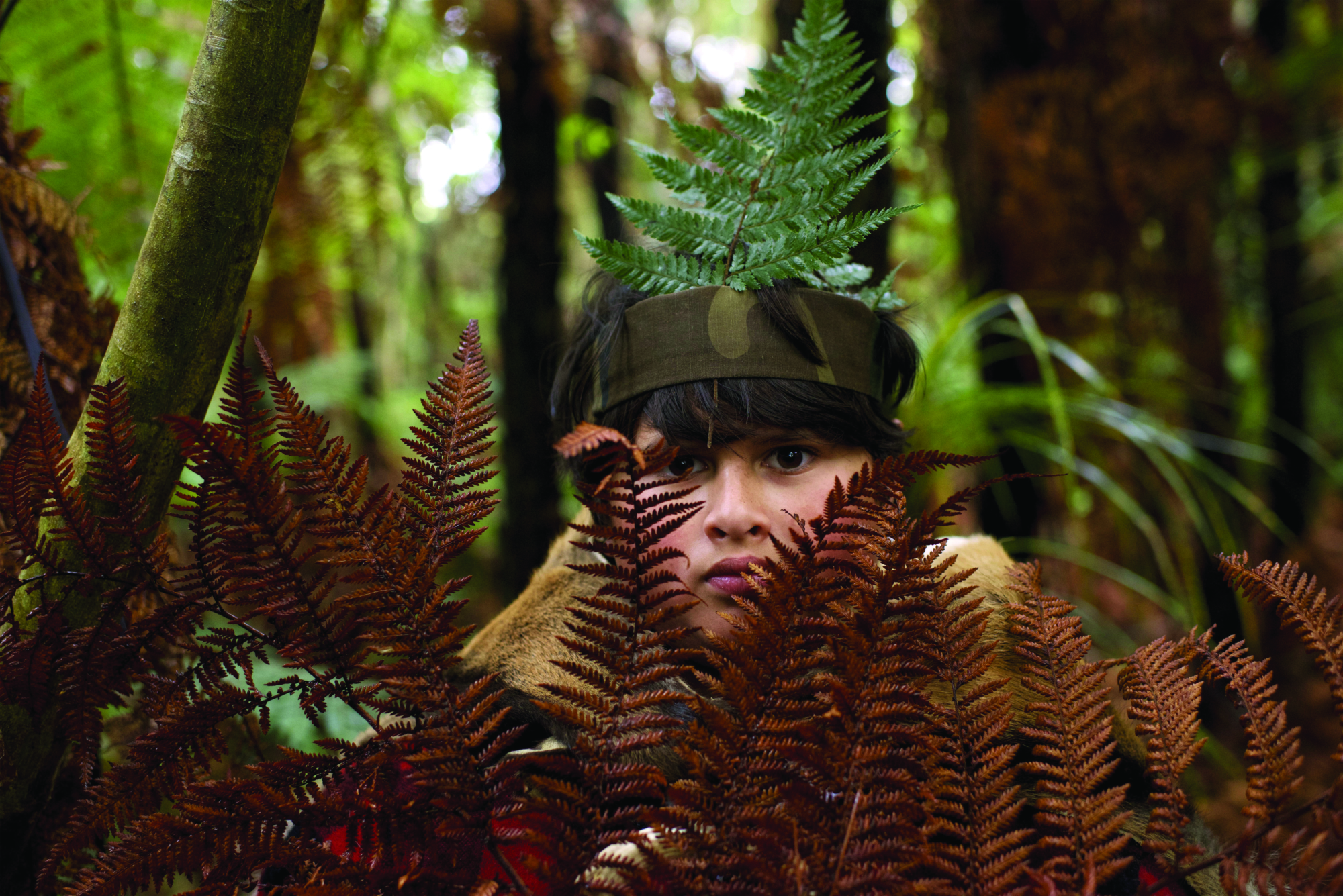There’s an early scene in Hunt for the Wilderpeople (Taika Waititi, 2016) in which foster child Ricky Baker (Julian Dennison) is sitting between his new parents, face lit by the candles on what looks to be his first ever birthday cake. Hector (Sam Neill) sits in stony silence while Bella (Rima Te Wiata), filled with an unshakable enthusiasm, sings a special birthday song she has written specifically for the occasion, accompanied by her keytar. ‘Ricky Baker, now you are thirteen years old / You are a teenager and you’re as good as gold,’ it starts. Both Ricky’s and Hec’s faces are unreadable as the song continues – until she reaches the lines ‘Once rejected / Now accepted / By me / And Hector / A trifecta’. There’s a beat as Ricky, Hec and the audience contemplate how to react, before Ricky draws a breath and joins in to sing the rest of the song, making it safe for us to keep laughing.
Wilderpeople is at once devastating and joyous, and all about the fragility of human connection; this is best demonstrated in the aforementioned moment in which celebration and sadness teeter and compete for centre stage. Indeed, the film as a whole focuses on the growing relationship between Ricky and Hec, the boy’s reluctant new guardian, as they are forced to go on the run in the New Zealand wilderness. ‘Sam said it is a sad film with funny stuff in it,’ Dennison tells me.
Ricky’s a foster child who has been moved from home to home. He’s a closed person; he doesn’t like talking to people. He’s not shy, but he’s not afraid to speak up and defend himself.
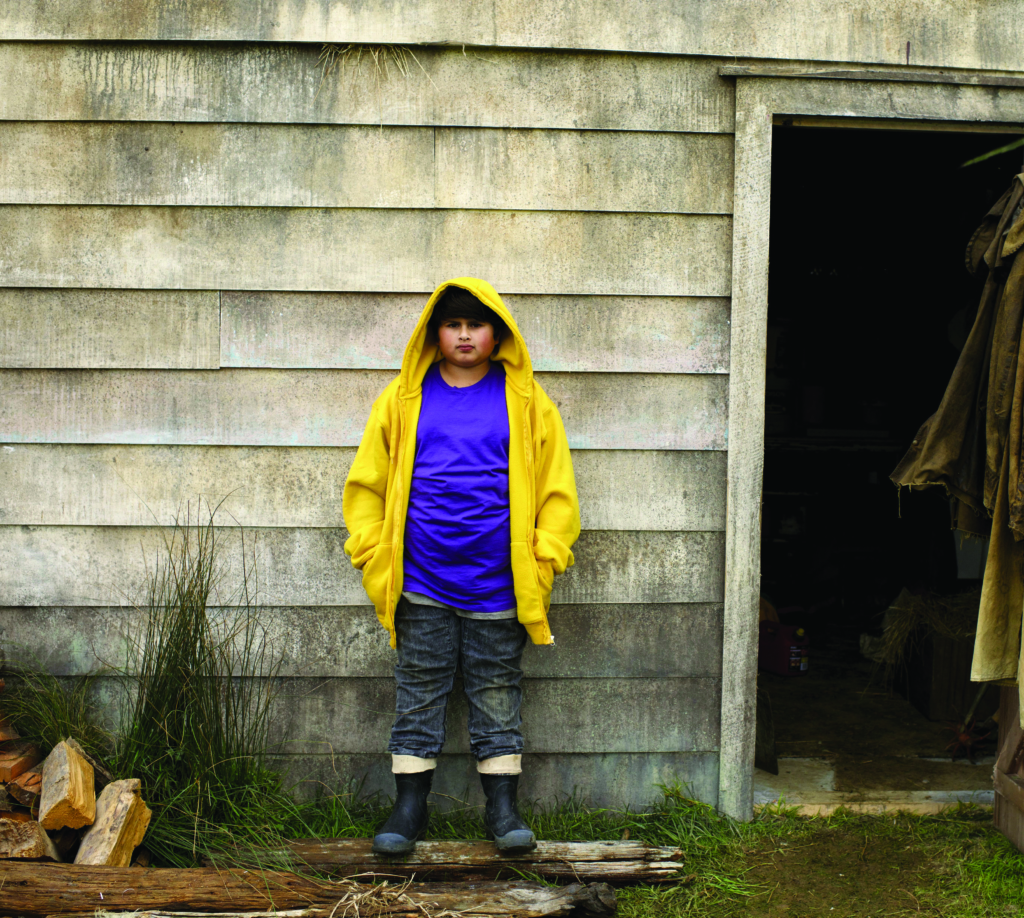
First and foremost, Wilderpeople is a family film. However, unlike the contemporaneously released Finding Dory (Andrew Stanton & Angus MacLane, 2016) and the entire Disney canon, the film isn’t satisfied with merely being palatable to viewers of every age. Beyond embodying a story that three generations can happily sit down and watch together, Wilderpeople taps into the growing sense of community and pride in national cinema that has emerged in the wake of Waititi’s gradual reshaping of New Zealand film on the world stage. His work has attracted widespread acclaim, with his filmography including What We Do in the Shadows (2014), Eagle vs Shark (2007) and Boy (2010),which soon became the highest-grossing film at the New Zealand box office. This trend continues with Wilderpeople, which has a 99 per cent ‘fresh’ rating on review aggregator website Rotten Tomatoes[1]‘Hunt for the Wilderpeople (2016)’, Rotten Tomatoes, <https://www.rottentomatoes.com/m/hunt_for_the_wilderpeople/>, accessed 22 July 2016. and has surpassed Boy as the country’s top local title, having taken in over NZ$11 million in box-office receipts as of July 2016.[2]New Zealand Film Commission, ‘Top Twenty New Zealand Films Released at New Zealand Box Office (to 15 July 2016)’, <http://www.nzfilm.co.nz/sites/nzfc/files/Top%2020%20July%202016.pdf>, accessed 22 July 2016.
Wilderpeople taps into the growing sense of community and pride in national cinema that has emerged in the wake of Waititi’s gradual reshaping of New Zealand film on the world stage.
The face of the film, twelve-year-old Dennison, already has an impressive resume of work. Wilderpeople is his third feature film and second time working with Waititi, who directed the young actor in an anti-drug-driving ad back in 2013. In it, Dennison plays the son of a man who would regularly ‘blaze’, and his re-creation of how the character’s father drove under the influence, while comedic, was undercut with a subtle darkness. Clearly very impressed with Dennison’s performance, Waititi later headhunted him for the role of Ricky Baker without an audition, a fact that Dennison is very humble about. ‘He chose me for it and he said he thought I’d fit the character,’ Dennison explains. He is full of praise for the director, who he feels helped him a lot through his first starring role. ‘It was amazing because he’s such a nice guy, such a good director, and put his own quirkiness into the film.’
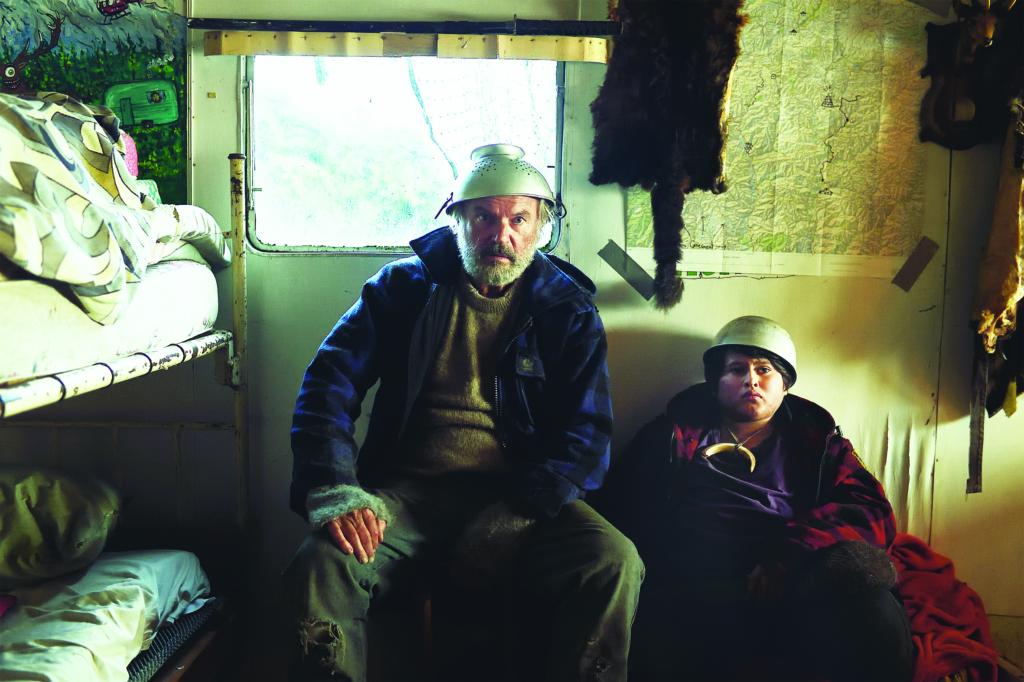
For Dennison, working on Wilderpeople was a six-week commitment: ‘It was one week of workshops and five weeks of filming,’ he recounts. During the workshop stage, he worked closely with both Neill and Waititi to hash out the complexities and nuances of his character. ‘A lot of people have been asking, “Do you see yourself in the character?”’ Dennison says. ‘I don’t really see myself in the character,’ he pauses, before clarifying, ‘but I definitely see a bit of Ricky Baker in me.’
The differences between working with Waititi on the ad and on the film were marked ‘because you’re spending a lot more time [together]’.
Because I was the main, there was a lot more one-on-one, like, ‘How do you want me to do this scene?’ and, ‘How should I say this line to make it work?’ and, ‘How should I respond?’ So it was a lot different working with Taika this time.
On top of Waititi’s direction, many of the cast members offered to help Dennison foster his craft and make his first major film role a good experience. While, on screen, Waititi veteran Rachel House plays Ricky Baker’s nemesis – Paula the rogue social worker – off screen, she acted as his dialogue coach. ‘She was awesome – every night, she made sure I knew the lines off by heart and really helped me get into the character,’ Dennison says.
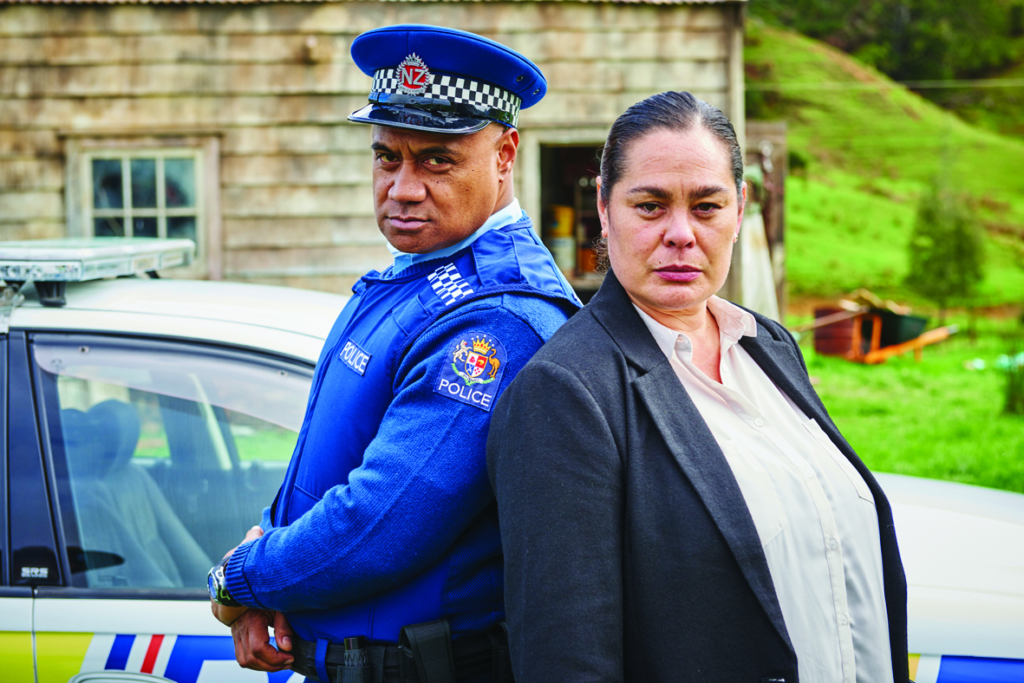
Regarding his relationship with Neill, Dennison laughs as he recalls first getting the news of working with the actor.
Mum was like, ‘Oh! You’re working with Sam Neill!’ and I’m like, ‘Who’s Sam Neill?’ He’s the generation before me, so I didn’t really know his work. But, when I searched him up on Dr Google, I was like, ‘Oh, Mum! It’s the guy off Jurassic Park [Steven Spielberg, 1993]!’
As the characters played by Dennison and Neill spend a lot of screen time together, having a good relationship behind the scenes was integral to making the film feel genuine. ‘Me and Sam – I feel like I can call him a friend now,’ he muses.
Sam and Taika doing the workshop was an amazing experience for me […] Sam really supported me with developing the character, and Taika really helped – every time we would go into a scene, he would make it funny. He would always make it feel like fun, not work.
There is a two-tiered sense of family encompassed in Wilderpeople. The first is that portrayed in Ricky Baker’s story itself, which is warm, funny and poignant, but Dennison also points to the sense of community and collaboration among the cast and crew.
There is a two-tiered sense of family encompassed in Wilderpeople. The first is that portrayed in Ricky Baker’s story itself, which is warm, funny and poignant, but Dennison also points to the sense of community and collaboration among the cast and crew. Fostering emerging talent is critical to the prolonged survival of an industry and, as we see with Wilderpeople, the present generation of performers and creatives rallied around Dennison to encourage and teach him. This has created a warmth that shines through in the film and gives it the genuine pathos that audiences have clicked with.
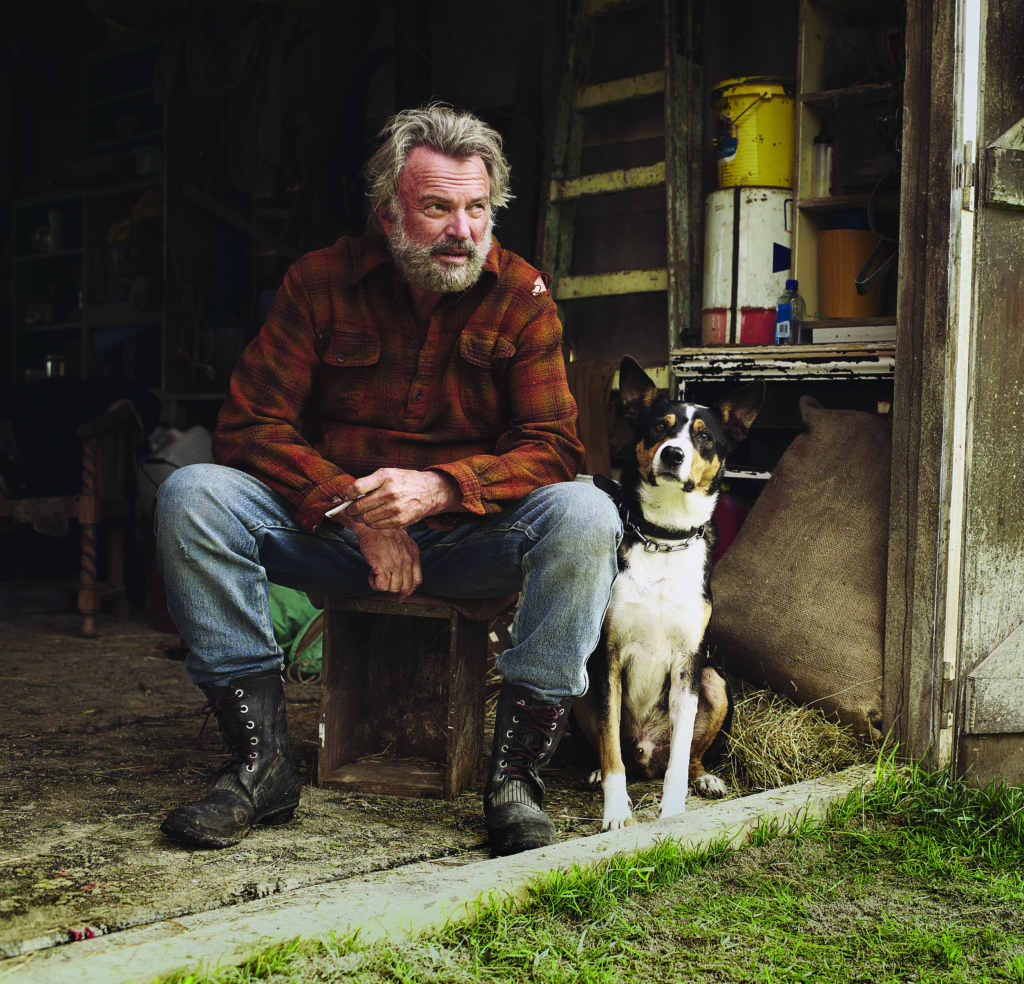
In addition to the theme of family, Wilderpeople takes on the notion of home in both plot and production; much like Waititi’s work as a whole, the film does not shy away from having a strong local focus. What We Do in the Shadows may, for the most part, take place in a spooky mansion, but when the characters do venture out, the contrast of their classic vampiric home against the daggy Kiwi nightclubs they frequent provides an additional layer of comedy – particularly as these scenes were shot on location and are thus familiar to local audiences. Similarly, much of Wilderpeople is set in the New Zealand wilderness hinted at in the film’s title. ‘Eighty-five per cent of it was in the bush – in winter!’ Dennison tells me. ‘Five weeks, only four of those days were in the city. A lot of it was cold,’ he laughs.
Cold, cold, cold … But going to these places that no-one had really been [to] before, where people didn’t really have the chance to go, seeing the New Zealand bush – it was really amazing and opened my eyes. Going to these remote places was awesome.
Making films that aren’t just filmed in New Zealand but also celebrate this fact, both in plot and aesthetic – which Waititi continues to do – is what is helping to rejuvenate enthusiasm for the country’s film industry. While American and, to a degree, British films are most commonly seen as ‘defaults’ by moviegoers, trying to simply replicate these cinemas’ formulas is unconstructive: if filmmakers ignore what makes their local industry unique, they deny viewers the chance to experience something different while, at the same time, feeding into the cycle of diminishing originality. Unfortunately, across the world, audiences often have a fraught relationship with locally made films – one bad experience can mar the lot, and many are unwilling to give homegrown films the same chance that they would a blockbuster.
Preconceptions are hard to shake, but, for the New Zealand industry, Waititi’s consistent output of high-quality, quirky films with a local focus are shifting the perception towards the positive, both at home and abroad. If you look at the director’s career progression, he has taken limited resources, a passion for his country and a left-of-centre sense of humour, and made these into products that are now far bigger than himself. He also invests in actors like Dennison and Boy lead actor James Rolleston, and draws on what is unique to New Zealand – particularly in terms of landscape and culture – to give the country greater prominence internationally. For a film that, on the surface, is relatively simple in terms of plot, Wilderpeople subtly packs a lot of punch. Woven throughout are comments about Maori culture in New Zealand today, quietly invoked through Ricky’s mostly unspoken past and rebellions. And, with the bulk of the film taking place in the natural New Zealand landscape, Waititi’s Wilderpeople is heavily grounded in its location, both aesthetically and thematically. This commitment to his community and performers has made a wide-reaching impact. Now, Waititi is also sharing his success for the benefit of aspiring filmmakers at large. This year, the Sundance Institute announced the Merata Mita Fellowship, named in honour of New Zealand’s first indigenous female filmmaker, which was designed to provide both financial support and mentorship for native and indigenous filmmakers worldwide. Waititi is one of the international partners of the initiative.[3]See ‘Sundance Institute Announces New Merata Mita Fellowship for Indigenous Artists and 2016 Recipient’, media release, Sundance Institute, 25 January 2016, <https://www.sundance.org/blogs/news/sundance-institute-announces-new-merata-mita-fellowship-for-indigenous-artists-and-2016-recipient>, accessed 22 July 2016.
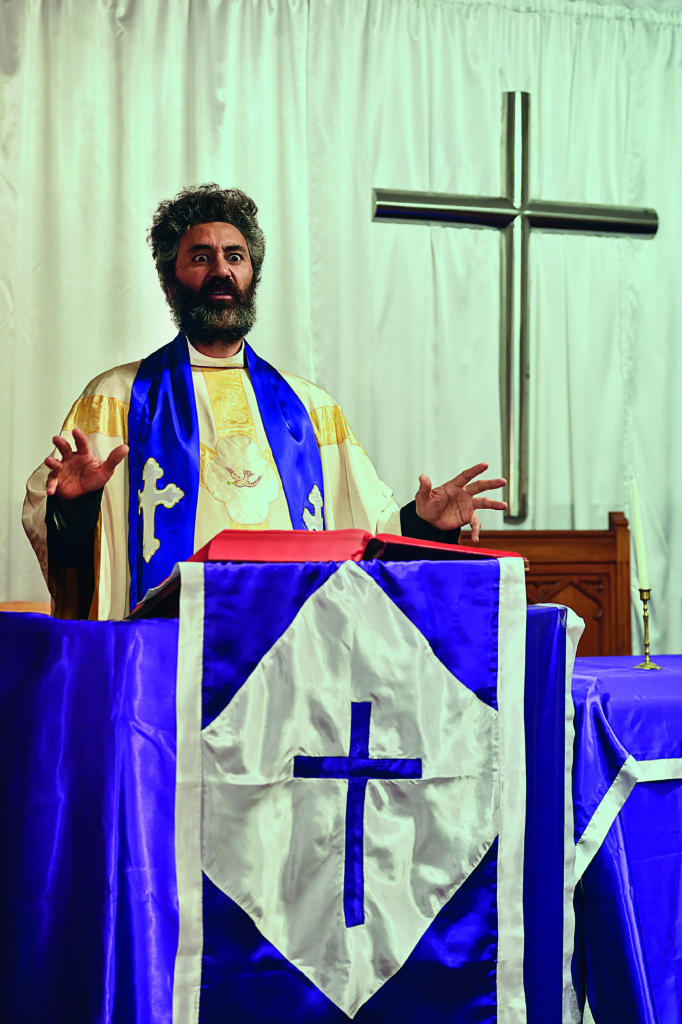
Hunt for the Wilderpeople explores the complex concepts of family and home, showing that the journey to find both is difficult yet worthwhile. As a film, it is pretty straightforward – the game of cat and mouse between Ricky and Paula comes to its inevitable end, and the narrative wraps up on a good note as we see Ricky settle in with a permanent and loving family. But, beyond this, as a representation of the direction New Zealand cinema is taking, it’s also hugely positive.
In the spirit of the film, Dennison is humble, funny and optimistic when asked what the next step on his own journey will be. ‘Probably school,’ he says straightaway.
I don’t know. After going to Sundance, Mum’s been getting a few emails from some production companies. We also have the American premiere, so that should be good. What the future beholds is pretty much … ah, I sound like Gandalf now.
Endnotes
| 1 | ‘Hunt for the Wilderpeople (2016)’, Rotten Tomatoes, <https://www.rottentomatoes.com/m/hunt_for_the_wilderpeople/>, accessed 22 July 2016. |
|---|---|
| 2 | New Zealand Film Commission, ‘Top Twenty New Zealand Films Released at New Zealand Box Office (to 15 July 2016)’, <http://www.nzfilm.co.nz/sites/nzfc/files/Top%2020%20July%202016.pdf>, accessed 22 July 2016. |
| 3 | See ‘Sundance Institute Announces New Merata Mita Fellowship for Indigenous Artists and 2016 Recipient’, media release, Sundance Institute, 25 January 2016, <https://www.sundance.org/blogs/news/sundance-institute-announces-new-merata-mita-fellowship-for-indigenous-artists-and-2016-recipient>, accessed 22 July 2016. |
